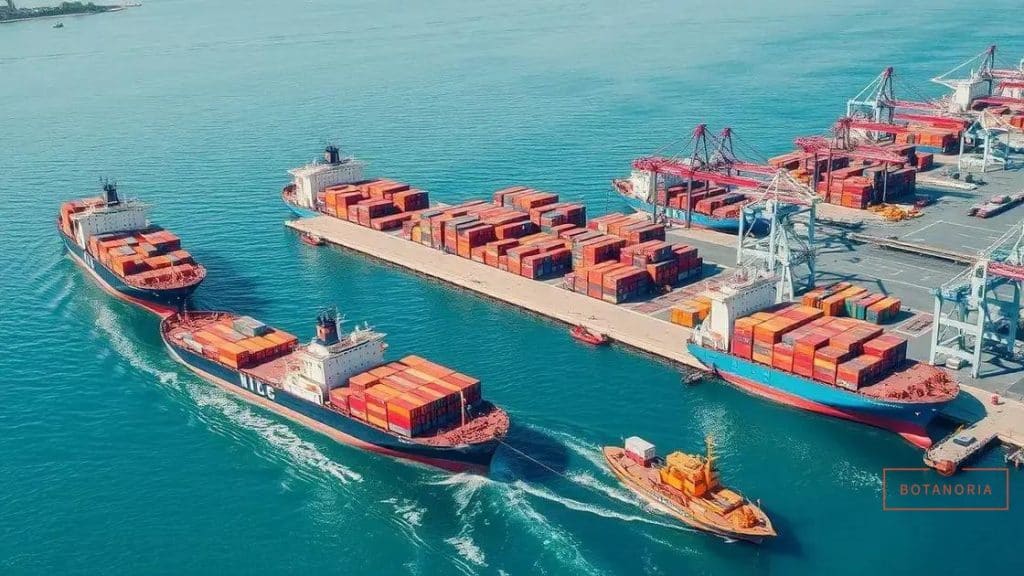Post-Brexit trade agreements: what you need to know

Anúncios
Post-Brexit trade agreements reshape trade dynamics between the UK and other countries, introducing new regulations, tariffs, and opportunities for market access while also presenting challenges in compliance and supply chain management.
Post-Brexit trade agreements are reshaping how businesses operate across borders. As countries adjust to new trade rules, there’s a lot to explore about what this means for you.
Anúncios
Understanding post-Brexit trade agreements
Understanding post-Brexit trade agreements is crucial for anyone involved in international commerce. These agreements have changed the landscape of trade between the UK and other countries, making it important to grasp their details.
Key Features of Post-Brexit Trade Agreements
Each agreement has specific rules that can affect businesses differently. Knowing what these regulations entail is essential.
Anúncios
- Customs procedures that may be different from EU rules
- Tariffs on products that could impact pricing
- Regulatory standards that may change
- Trade facilitation measures for smoother processes
Moreover, understanding the implications of new tariffs can help you plan better. For instance, if your business imports goods, higher tariffs may lead to increased costs.
Also, many agreements may include provisions for services and investments, allowing businesses to operate more freely. Post-Brexit trade agreements aim to promote fair competition and reduce trade barriers.
The Role of Negotiations
Negotiations play a significant role in shaping these agreements. Countries engage in discussions to establish terms that benefit both parties. It’s interesting to track how these talks unfold since they can result in significant changes to market access.
It’s also worth noting how different sectors can be impacted. Agriculture, manufacturing, and technology may see varied outcomes. Understanding these nuances can give businesses a competitive edge as they adapt to the new trade environment.
Key benefits for businesses

Understanding the key benefits for businesses in a post-Brexit world is essential for success. The new trade agreements offer various opportunities that companies can leverage to grow and thrive.
Improved Market Access
One significant benefit is improved market access. Businesses can explore fresh markets that were previously challenging. This allows for greater customer outreach and increased sales potential.
- Opportunity to enter new geographic regions
- Increased options for sourcing products
- Access to a broader consumer base
- Potential for higher revenues
By adapting to these opportunities, businesses can strengthen their position in the market. They can also diversify their offerings, leading to greater resilience.
Reduced Regulatory Burdens
Another advantage is the reduction of regulatory burdens. Some agreements aim to simplify customs procedures and eliminate unnecessary red tape. This means less time spent on compliance and more time focusing on core activities.
Moreover, improved ease of doing business can empower companies to innovate and expand. As they face fewer hurdles, businesses can concentrate on what matters most: creating value for their customers and stakeholders.
Additionally, many agreements involve provisions promoting fair competition. This encourages a level playing field where businesses can thrive without unfair practices.
Challenges in navigating new trade terms
Navigating new trade terms can present various challenges for businesses after Brexit. Understanding these challenges is crucial to adapt successfully.
Complex Regulations
One of the most significant hurdles is the complexity of regulations. After Brexit, businesses must familiarize themselves with new rules and compliance requirements that could differ from past agreements.
- Customs procedures that may delay shipments
- Changes in tariffs affecting pricing strategies
- Need for accurate documentation to avoid penalties
- Variation in standards required by different countries
This complexity can lead to confusion and increased costs for businesses. Staying informed and possibly engaging with customs experts can be helpful.
Supply Chain Disruptions
Additionally, many companies face supply chain disruptions. With new trade agreements, businesses may experience delays in importing or exporting goods.
These delays can affect the overall delivery timelines, putting pressure on inventory management. As a result, businesses might need to keep higher stock levels to prevent shortages.
Furthermore, companies may have to switch suppliers or adjust logistics routes to ensure timely deliveries. Building strong relationships with reliable suppliers can mitigate some of these challenges.
Impact on EU and UK relations

The impact on EU and UK relations post-Brexit is significant and complex. The nature of these relations has evolved, creating new dynamics in trade, diplomacy, and cooperation.
Trade Relationships
One major aspect is the changing trade relationships. With the new agreements, trade barriers have been redefined. This can lead to both opportunities and challenges for businesses.
- New tariffs altering pricing on goods
- Potential for trade agreements with other countries
- Shift in which goods are imported and exported
- Increased competition in certain sectors
These changes mean businesses must be strategic in their trading practices, adapting to a new landscape.
Diplomatic Relations
Furthermore, diplomatic relations between the EU and the UK have been affected. Discussions around security, environmental issues, and immigration policy continue to evolve.
As each side aims to assert its interests, the UK may seek to strengthen ties with non-EU countries, influencing its approach in negotiations. Meanwhile, the EU must navigate these changes while maintaining unity among member states.
Calls for cooperation in shared challenges such as climate change and security might find common ground, allowing both sides to benefit despite the shifting landscape.
Future trends in post-Brexit trade
The future trends in post-Brexit trade are evolving as businesses adapt to new realities. Companies are continuously evaluating how to optimize their operations in light of changes.
Increased Digital Trade
One of the notable trends is the increase in digital trade. As more businesses engage online, e-commerce platforms become vital for reaching customers. This shift allows companies to expand beyond their traditional markets.
- Growth of online marketplaces
- Enhanced use of technology for logistics
- Focus on digital marketing strategies
- Investment in cybersecurity for online transactions
With digital channels becoming essential, companies must focus on improving their online presence to stay competitive.
Sustainability and Ethical Practices
Another critical trend is the emphasis on sustainability and ethical practices. Consumers increasingly prefer products from companies that prioritize environmental responsibility. This demand is prompting businesses to reevaluate their supply chains.
Focusing on sustainable practices can result in branding advantages. It can also lead to cost savings through efficiency improvements.
As regulations around sustainability tighten, companies may need to adjust their operations to comply with new standards. Staying ahead of these trends can position businesses as leaders in their fields.
In summary, navigating the world of post-Brexit trade offers both challenges and opportunities for businesses. Understanding the new trade agreements is crucial, as they impact everything from market access to regulatory requirements. Companies must adapt to changes by embracing digital commerce and focusing on sustainability. As the landscape evolves, staying informed and flexible will help businesses thrive in this new environment.
FAQ – Questions about Post-Brexit Trade Agreements
What are post-Brexit trade agreements?
Post-Brexit trade agreements are new contracts established between the UK and various countries following its departure from the EU, outlining tariffs, customs, and trade regulations.
How do these agreements affect businesses?
These agreements can impact businesses by changing market access, introducing new tariffs, and requiring compliance with different regulatory standards.
What benefits do post-Brexit agreements offer?
They provide opportunities for improved market access, potential cost savings, and the ability to explore new markets outside the EU.
What challenges might businesses face under the new agreements?
Businesses may encounter complex regulations, supply chain disruptions, and the need to adapt to unfamiliar customs procedures.





